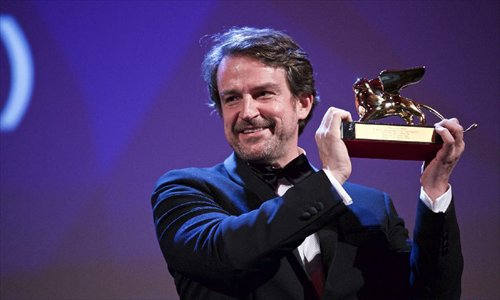ARTS / FILM
Venice Int'l Film Festival closes with Golden, Silver Lion to South American films

Venezuelan director Lorenzo Vigas holds the Golden Lion prize for his movie "Desde Alla" (From Afar), during the award ceremony at the 72nd Venice Film Festival, at the Lido of Venice, Italy, September 12, 2015. The Venezuelan film won the Golden Lion for Best Film, the highest prize awarded at the 72nd Venice International Film Festival which closed here at the Lido of Venice on Saturday. Photo:Xinhua
The curtain closed on the 72nd Venice International Film Festival on Saturday night, with the Golden Lion given to Desde Alla (From Afar) by Venezuelan director Lorenzo Vigas and the Silver Lion to El Clan by Argentinian director Pablo Trapero.
After 11 days featuring 21 films screened in the official selection, film-makers and stars made their final appearances on the Red Carpet rolled out at the Lido of Venice for the closing ceremony.
"It is the first time in history that we have a film in Venice," said Vigas as he was announced as winner of the Golden Lion, the highest prize of the festival, which was founded in 1932 and enjoys the distinction of the oldest film festival in the world.
"It is a bit a surprise but I know it has been very well received in my country, where we had some problems in the last years, but I hope this award is going to help," Vigas added.
His debut film tells the story of a middle-aged businessman who suffered trauma from his father when he was younger. Now, he is buying the sexual favors of young men on the streets of Caracas.
One day, he meets a young street hustler with whom he forms a dysfunctional relationship. Vigas said it was a story also about parenthood, or lack of father from both characters. In fact the relationship between them is also a relationship about the father and a young person who never had a father.
The Silver Lion award for Best Director went to another South American, Argentinian director Trapero, for his El Clan, based on a true story set in San Isidro, Argentina, where a sinister clan makes its living off kidnapping and murder.
The Grand Jury Prize went to Anomalisa by American directors Charlie Kaufman and Duke Johnson, a stop-motion animation film shot with puppets, while Italian Valeria Golino and French Fabrice Luchini took the best actress and best actor awards.
The Orizzonti selection, dedicated to the latest cinema trends, gave the Award for Best Film to Free in Deed by US director Jake Mahaffy, set in the distinctive world of storefront churches.
The Orizzonti Award for Best Director went to US director Brady Corbet for his The Childhood of a Leader, inspired by the early childhood events of many of the great dictators of the 20th century.
The Venezia 72 jury, chaired by Mexican film director Alfonso Cuaron, included Taiwanese director Hou Hsiao-hsien, winner of the Golden Lion at the Venice festival in 1989 for A City of Sadness.
The Orizzonti jury included Hong Kong director Fruit Chan, twice in competition at the Venice festival with Durian Durian in 2000 and Hollywood, Hong Kong in 2001.
The festival closed with Mr. Six (Lao Pao Er), a film by Chinese director Guan Hu with "strong original elements" and "a capacity to reflect on the transformations of China's society," according to the festival's director Alberto Barbera.
A total of eight Chinese films were presented among the 55 screened in the official selection - 21 striving for the Golden Lion in the Venezia 72 section, 18 in Orizzonti and 16 out of competition - highlighting a "special moment for China," as Barbera defined it.
Barbera said the Venice festival, which was attended by roughly 7,000 cinema professional and 2,800 journalists, treasures the complexity of today's Chinese cinema "whose market is booming," and "is working to make various Chinese cinemas known in the world."
